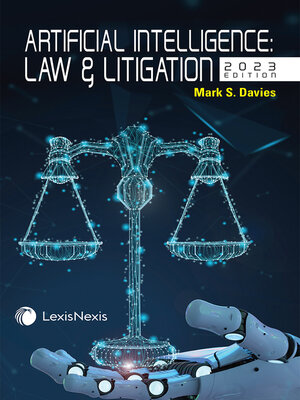
Sign up to save your library
With an OverDrive account, you can save your favorite libraries for at-a-glance information about availability. Find out more about OverDrive accounts.
Find this title in Libby, the library reading app by OverDrive.



Search for a digital library with this title
Title found at these libraries:
| Library Name | Distance |
|---|---|
| Loading... |
Artificial Intelligence litigation is happening now. The recent success of AI is driven by powerful computing systems that "learn" from the deep study of vast troves of data and then use the new learnings to make nuanced decisions without direct human engagement. It has brought us medical diagnostic advances, useful virtual assistants, and tempting relevant advertising. With this increase in market success has come the predictable increase in litigation, which is why Artificial Intelligence: Law & Litigation should be added to any practitioner's library.
The 2024 Edition of Artificial Intelligence: Law & Litigation reviews recent judicial opinions that discuss Artificial Intelligence—the terminology, statutes and precedent needed by all attorneys interested in the development of the rule of law in this emerging area. Organized alphabetically, substantive legal areas of Artificial Intelligence rulings covered include:
Each chapter reflects an appellate approach to AI litigation strategy. An appellate approach to law coheres applicable legislative statutes, judicial rulings, and sound policy to reach the correct ruling for a particular dispute. To apply this approach to AI litigation, however, lawyers must first learn how to talk about AI.
Accordingly, the treatise begins with a discussion of the terminology needed for a conversation about AI. And while the statutory words do not refer to AI, the appellate approach starts with the relevant statutory words. Each chapter, therefore, begins with the most relevant statutes. In addition to clarity on terminology and familiarity with the key statutes, the litigator must know AI precedent. For each subject area, therefore, the treatise provides a careful discussion of the relevant cases. Along with the terminology, applicable statutes, and cases, each chapter also includes commentary to guide future strategies. A final chapter uses the Emotional Intelligence moniker to bring attention to judicial reactions to the power of AI.







